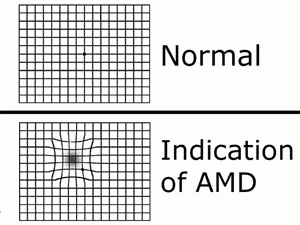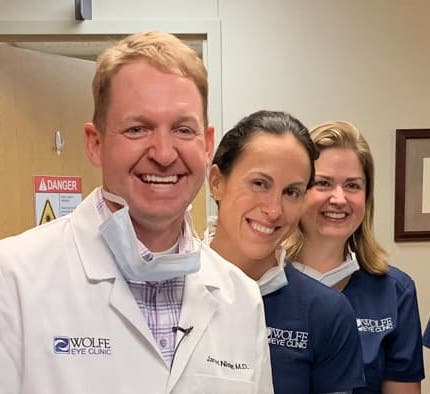What is Macular Degeneration?
Age-related Macular Degeneration (AMD) is a disease associated with aging that gradually destroys sharp, central vision. The disease affects the macula, the central area of the retina that allows a person to see fine detail. Individuals can lose all but the outermost peripheral vision, leaving dim images or blank spots at the center of vision.
Central vision is needed for seeing objects clearly and for common daily tasks such as reading, driving, identifying faces and watching television. AMD is a leading cause of vision loss and legal blindness in adults over 60 in the United States and is considered an incurable eye disease.
 Unfortunately, if you suffer from macular degeneration you can reach a point where the vision is not able to be corrected with glasses, contact lenses or surgery. It is important that you see an eye doctor as soon as any vision changes are noticed to ensure timely care for any possible eye disease or condition. If necessary, your eye doctor will recommend you to the macular degeneration specialists in the retina department at Wolfe Eye Clinic.
Unfortunately, if you suffer from macular degeneration you can reach a point where the vision is not able to be corrected with glasses, contact lenses or surgery. It is important that you see an eye doctor as soon as any vision changes are noticed to ensure timely care for any possible eye disease or condition. If necessary, your eye doctor will recommend you to the macular degeneration specialists in the retina department at Wolfe Eye Clinic.
What causes Macular Degeneration?
The cause of AMD is not completely known. However, the greatest risk factor is age. The risk of having AMD increases with age, from 10% at age 50 to about 30% at age 75. Recent studies have shown that genetics are another major risk factor, and upwards of 70% of patients could have an affected relative. Other factors that increase the risk of developing AMD include smoking, diet, weight, and race. According to the National Institutes of Health, Caucasians are much more likely to lose vision from AMD than other races. Lifestyle practices like not smoking, eating a healthy diet high in green leafy vegetables and fish, exercising and maintaining normal weight and blood pressure may play a role in reducing the risk of developing AMD. The macular degeneration specialists at Wolfe Eye Clinic are consistently involved in clinical trials to look for improvements in the treatment options for patients that suffer from macular degeneration.
Wet vs. Dry Macular Degeneration
Macular degeneration is diagnosed by your eye doctor who can determine what type of disease is present. All AMD starts out as dry AMD. Dry AMD is much more common than wet AMD, with about 90% of people having the dry type and 10% of people having the wet type. However, even though the wet type is less common, a majority of the severe vision loss comes from wet AMD. In the past, there was no effective treatment for wet AMD and those individuals would almost always lose vision. Fortunately, there are now treatments for wet AMD that can save and even improve the vision for people who suffer from this disease. Our macular degeneration specialists reveal what you need to know about wet vs dry macular degeneration so that you can best understand the symptoms and treatment options.
Watch our video that explains the differences between Wet & Dry Age-Related Macular Degeneration!
Dry Macular Degeneration
Dry AMD, also called non-neovascular AMD, occurs when the light-sensitive cells in the macula slowly break down (degenerate) causing gradual blurring of the central vision in the affected eye. It is diagnosed when yellow deposits called drusen accumulate in the macula. Dry AMD causes gradual central vision loss and distortion, but the loss usually is not as severe or abrupt as can be found with the wet type. In some severe cases of dry AMD the retina tissues become thin and lose their ability to function properly.
Wet Macular Degeneration
Wet AMD, also called neovascular AMD, occurs when abnormal blood vessels (choroidal neovascularization) behind the retina start to grow under the macula. These new blood vessels tend to be very fragile and often leak blood and fluid. This process can cause scarring and permanent damage to light-sensitive retinal cells, which creates permanent blind or blurry spots in the central vision. If you develop wet AMD you will need treatment from a retina or macular degeneration specialist to prevent you from permanently losing vision.
Signs of Macular Degeneration
In early stages of macular degeneration, vision may not be affected. Later, as the disease progresses, you may experience signs of macular degeneration including:
- Wavy, distorted or blurred vision
- Straight lines in objects such as blinds or doorways may become wavy
- A small blind spot can develop in the center of the vision making it difficult to read or see objects clearly
If the condition worsens, the central vision may be completely lost. Most people with AMD retain their peripheral or side vision. However, loss of the central vision from AMD can prohibit patients from reading, driving, watching TV, recognizing faces or doing things they like to do on a daily basis.
The signs of macular degeneration may develop gradually, especially with the dry form. If only one eye is affected, many people may not notice changes in vision until the disease gets moderately worse as the other healthier eye can compensate for changes in vision. Having an annual eye exam with your eye doctor is very important for detecting AMD and other ocular disorders early in their progression.
It is important for people with AMD to monitor their vision closely and to call their eye doctor if there is a change. If your doctor becomes concerned about wet AMD they may refer you to a retina specialist or a macular degeneration specialist for treatment.
 One way to monitor vision or detect signs of macular degeneration at home is with an Amsler grid. The Amsler grid, which looks similar to a section of graph paper, can aid in the earlier detection of visual disturbances caused by changes in the retina. The Amsler grid is a test that can reveal clinical changes before other visual symptoms develop. With new and reliable treatments for wet AMD, this tool is important for the early detection of wet AMD.
One way to monitor vision or detect signs of macular degeneration at home is with an Amsler grid. The Amsler grid, which looks similar to a section of graph paper, can aid in the earlier detection of visual disturbances caused by changes in the retina. The Amsler grid is a test that can reveal clinical changes before other visual symptoms develop. With new and reliable treatments for wet AMD, this tool is important for the early detection of wet AMD.
Request a FREE Amsler Grid
Treatment for Macular Degeneration
While there is no cure for age-related macular degeneration, there are things that you can do to decrease the risk of vision loss and prevent the AMD from worsening. Treatment starts by understanding the type and severity of your disease with an eye exam. Your eye doctor will dilate and carefully examine your eyes and use photographs to understand what is going on. The photographs may include scans of the retina (optical coherence tomography or OCT) or images of the blood vessels and blood flow (fluorescein angiogram or FA). Your eye doctor may refer you to a retina specialist at Wolfe Eye Clinic who will partner with them to provide the care you need.
Dry AMD Treatments
The National Eye Institute’s Age-Related Eye Disease Study (AREDS) found that taking a specific high-dose formulation of antioxidants and zinc in addition to a regular multivitamin can reduce the risk of progression of dry AMD in some patients. If you have intermediate or advanced AMD in one of your eyes you should be taking an AREDS supplement. Your eye doctor will determine whether you would benefit from taking the AREDS supplement. The AREDS formulation is not a cure for AMD. It will not restore vision already lost from the disease. However, it may help to delay the onset of advanced AMD and help people who are at high risk for developing advanced AMD keep their vision.
AREDS vitamin supplements are currently the only recommended treatment for dry AMD. However, Wolfe Eye Clinic retina specialists are actively investigating new potential treatments for geographic atrophy, a severe form of dry AMD.
Watch our video to find out if AREDS vitamins for macular degeneration are right for you!
Wet AMD Treatment Options
Eye Injections for Macular Degeneration
Wet AMD is most often treated with intravitreal injections of medicine into the eye. Eye injections sound scary but are painless and usually well tolerated by patients. The injections deliver medicine inside the eye near the retina to block harmful signals (VEGF) that cause growth and leakage of abnormal blood vessels under the macula. When injection treatment is started, the injections are often given monthly. In some cases, depending on the response to the treatment, your injections can be spaced out.
There are several different medications used to treat wet AMD. Your retina specialist will work with you to identify which medication is the best option for your care. The goal of the treatment is to keep the wet AMD under control with the least amount of treatment possible. In the vast majority of cases, long-term injection treatment is needed to control the wet AMD and preserve vision. Unfortunately, the injections are not a cure for wet AMD, but with expert treatment by our fellowship-trained retina specialists, we are able to preserve vision in a large majority of people.
Learn more about eye injections
Laser Treatments for Macular Degeneration
Most cases of wet AMD are treated with injections. Some difficult to treat eyes may benefit from older laser treatments (thermal laser or photodynamic therapy) to help preserve vision and reduce treatment. Laser is usually administered in addition to injection treatments. The laser procedure is usually performed following additional photographic testing (fluorescein angiogram) which is used to better identify the abnormal blood vessels. In the modern era, the majority of laser procedures are with a “cold laser” or photodynamic therapy (PDT). A laser light is used to activate an intravenous medicine (Vertiporfin) as it courses through the abnormal blood vessels in the macula, thus sealing the leak.
Wolfe Eye Clinic Participates in Macular Degeneration Clinical Trials
 Our macular degeneration specialists in Iowa are actively involved in advancing treatments to improve outcomes and reduce treatment burdens for individuals with AMD. If appropriate, your doctor will discuss possible participation in one of our clinical trials focused on working to help people with AMD. Our doctors are up to date on all of the possible treatment options available and will guide you to the best approach for your eye health. At Wolfe Eye Clinic, our retina specialists bring a vast amount of advanced training and skill to each patient we care for.
Our macular degeneration specialists in Iowa are actively involved in advancing treatments to improve outcomes and reduce treatment burdens for individuals with AMD. If appropriate, your doctor will discuss possible participation in one of our clinical trials focused on working to help people with AMD. Our doctors are up to date on all of the possible treatment options available and will guide you to the best approach for your eye health. At Wolfe Eye Clinic, our retina specialists bring a vast amount of advanced training and skill to each patient we care for.
Learn more about clinical trials
Top Macular Degeneration Specialists Near You
Wolfe Eye Clinic has expertise in treating macular degeneration, wet AMD, and dry AMD. Wolfe Eye Clinic macular degeneration specialists offer care and treatment for retina diseases in Iowa with locations in Ames, Ankeny, Cedar Falls, Cedar Rapids, Des Moines, Fort Dodge, Iowa City, Marshalltown, Ottumwa, Spencer, Waterloo, and Pleasant Hill.
If you have any retina-related questions or would like to schedule an appointment, please call us at (833) 474-5850 or request information here.